Living a High Rise Life in River North: 200 W. Grand
There has been a rush of new high rises built in the River North neighborhood in the last 6 years including The Grand on Grand at 200 W. Grand.
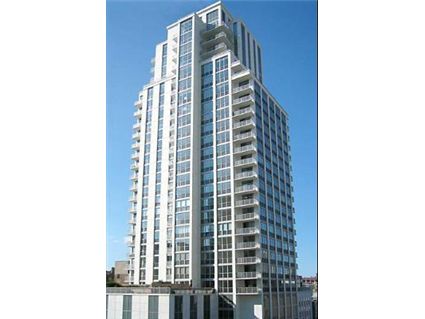
The 106 unit building is centrally located near transportation and the expressways but also within walking distance of Michigan Avenue and a host of restaurants.
A 2-bedroom unit recently came on the market. It has granite counters and stainless steel appliances in the kitchen and upgraded marble and slate baths.
The listing also says it is a well-financed building which hasn’t raised assessments in 3 years.
Which begs the question: In this kind of market, is the health of the building a dealmaker – or breaker – for prospective buyers?
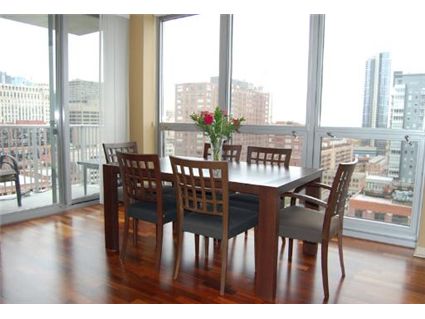
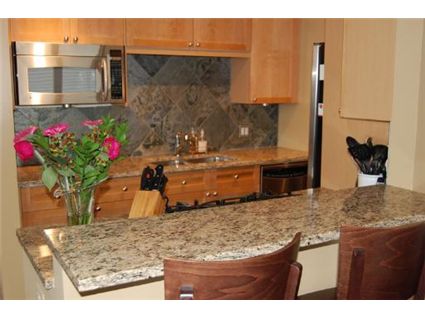
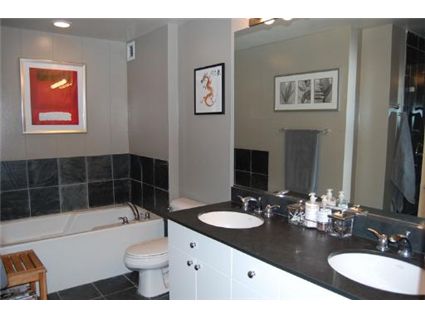
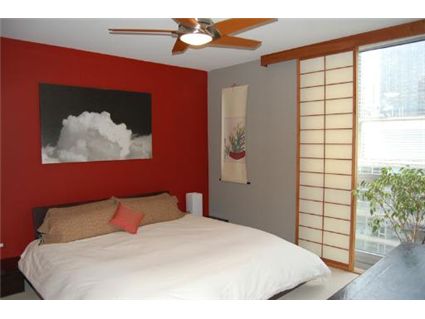
The unit is listed through Berg Properties. See more pictures here.
Unit #1603: 2 bedrooms, 2 baths, 1250 square feet
- Sold in June 2004 for $398,000 (included the parking)
- Currently listed for $462,500 (parking is $37,000 extra)
- Assessments of $611 a month (includes heat, A/C, cable, doorman)
- Taxes of $4021
- Bedroom #1: 13×13
- Bedroom #2: 13×10
They will be lucky to get what they paid in 04.
$400 a sqft? (including parking)
I hope this gets sold at this price, it would do well for my comps! LOL
1504 has been on the market for 73 days and listed at $394,500 for the same 1250 SF. So whoever is selling this unremarkable place for $462,500 has a while to keep smoking the good stuff.
If you include the parking (which I do…), you get $400/SF — really? In a building like this, how big can a special assessment be? Not more than the $100K the buyer would overpay here for this place. So, to answer your question regarding the adequacy of reserves – not a big deal here. The seller has to find some selling point because the place won’t sell itself (really it won’t – look at the pictures).
Hi everyone. It’s me. Just wanted to know what you all thought of this. I live in a studio in the Gold Coast. My 2nd installment is 236% higher than my first installment. And my 2008 taxes are 168% higher than 2007. Of course on plan on appealing. Please keep the snark to a minimum.
Is this place worth $3k+/month (including the parking)?
And, even if we assume that the ’04 price was the lowest pre-con price available, what makes them think that +4.2%/annum makes sense in this market.
I’m sorry, is there a typo here….or has reality escapped this listing. Am I doing the math right?? Is this actually listed (inc parking) at ~25% more than the 2004 price.
Seriously?? I think this listing may have jumped the shark.
Dollface:
First make sure that you actually got the bill for the correct PIN, and that the PIN doesn’t include anything other than your unit. Assessor’s website is where I’d start. When there, also check on whether you’re homeowner’s exemption was logged.
Any chance that there were any home-improvement exemptions that expired after ’07?
$611 a month for assessments – no wonder why they havent raised it!
Unit 1503, 1 floor below this one, Closed on 6/25/2009 for $397,500
And Yes, it appears the parking was included in that sale.
Yup. The health of the association is important to both potential buyer and any applicable lender. Low owner occupancy, litigation, poor collections, etc., according to a loan officer I spoke with, will determine whether or not a bank will provide funding for a unit in a particular building.
Back in the 90s I walked away from several deals because the associations’ health were in questionable shape. Great locations, but it just didn’t seem worth it.
Given the overabundance of inventory out there today, you might as well choose from the healthiest buildings. Whether or not that provides any leverage for the seller from a pricing standpoint, I dunno. Comps are comps, it will be interesting to see how this evolves — it at all.
“Unit 1503, 1 floor below this one, Closed on 6/25/2009 for $397,500
Haahahahahaahahahahaahahahahahaahahahahaaaaaaaaaaaaaaaaahahahahahahahahahaahahahahaahahahahahaahahahahaaaaaaaaaaaaaaaaahahahahahahahahahaahahahahaahahahahahaahahahahaaaaaaaaaaaaaaaaahahahahahahahahahaahahahahaahahahahahaahahahahaaaaaaaaaaaaaaaaahahahahaha!!!!!!
500k???????? even if the 2004 price is first in the door pre-construction, 500k????
pass the dutchy to the left hand side my friend!
Off topic a bit: does anyone know where to find (or who installs) shoji doors such as the one shown in the BR photo?
Try The Sliding Door Company-They are right downtown on Ohio
http://www.slidingdoorco.com/
The financial health of the building is one of the first things a prospective condo or co-op buyer ought to scrutinize, the other being the physical health of the place. It has never been so important to scrutinize the financials, because your liabilities as an owner are endless, and we’ve never had so many financially challenged buildings as now.
I would never have given it a lot of thought ten years ago. Then, it would have been sufficient to look at the budget, the reserve fund, and know about deferred maintenance and repairs.
But now, you have to know how many people are in foreclosure and/or in arrears in their assessments and taxes. You need badly to know all this because guess who will be picking up the slack for defaulting owners? YOU and other paying owners will, and it might be more than you can afford.
This is the worst aspect of condo or co-op ownership- the open-ended liabilities. If you live in a SF house and your neighbor lets his pipes freeze because he couldn’t pay to heat the place, or because it was foreclosed and abandoned, it is not your problem. But in a condo, it is yours.
The featured apartment is beautiful, by the way, and it’s in a super location. But still…… the 2004 price is darned enough, and maybe there should be a discount from that, given the house of cards that the current economy is.
Do condo associations have to release their “health records” to prospective buyers? And if they do, how likely are they to be honest about upcoming special assmts or an increase in dues to cover distressed non-payers?
“The featured apartment is beautiful, by the way…”
Wow, you are easy to please. I would agree on the “apartment” comment.
“Do condo associations have to release their “health records” to prospective buyers? And if they do, how likely are they to be honest about upcoming special assmts or an increase in dues to cover distressed non-payers?”
Lauren,
from what i learned here at CC, the banks require the HOA to fork over the financials.
Russ will be able to elborate more since thats his field.
“It has never been so important to scrutinize the financials, because your liabilities as an owner are endless”
You are exactly right. Owning a condo is like writing options. Downside is (seemingly) unlimited.
LOL at this owner thinking they are going to move this place for over the 2004 price when their neighbor has a perfect comp that isn’t moving at the 2004 price.
“But now, you have to know how many people are in foreclosure and/or in arrears in their assessments and taxes.”
Question, I’m aware of how you can attain the budget or the reserve fund info, but how do you attain information like how many people are arrears in their assesments and taxes? That sounds difficult to attain. Just look at the foreclosures? What if renters aren’t paying assesments?
Tom,
Assessments: -put it in the contract
-ask the seller/association
-ask the mgmt co.
-ccrd for condo assoc liens (many are never filed.)
Taxes:
-Cook County Treasurer’s site PIN search.
As a member of the HOA, we fill out condo questionairres for the lenders once an offer is accepted and the financing is being underwritten. IN the last 5 years no owner has ever asked for this info ahead of time (which I assume means no prospective buyers have asked the sellers).
The questionaire asks about special assmnts, balances, units rented, unit in arears, and similar.
The lenders will typically ask for budget,reserves, decs & by laws, current insurance coverage, and there is a questionnaire that is completed that covers number of units, commercial space, litigation, # for sale, # for rent, # delinquent, etc.
In the past, we used to get “limited reviews” so as long as you had decent credit, all we really cared about was the insurance coverage and litigation but those are pretty much gone the way of the dinosaur. However, even with 20% down, the lender is still going to request all of the above. They aren’t very lenient either about something being sub par.
A strong HOA is more important than ever.
A good RE agent and attorney better be reading the minutes of the HOA if they are earning their commission looking for even discussions of potential special assessments.
In counseling a client on a prospective purchase, (i.e. evaluating what the place is worth) wouldn’t it be a good idea for the real estate agent to have a comprehensive evaluation kit including some due diligence as to the financial health of the property? Or shall we just rush to write the offer, blind to these underlying details. But wait, ….that kind of information might kill the sale and we don’t get paid unless the sale goes through. What should I do? Isn’t this information so basic…. as basic as room sizes, numbers of baths and parking spaces? Why is all this financial information so difficult to find? What if my buyer asks me to show him only properties with excellent financial health. Where can I get a compilation of this data? Do I have to do all the research on my own?
Section 22 of the Illinois Condominium Property Act says that any prospective purchaser has the right to inspect the financial health of the association. It also says that if there are any material changes that occur between the contract getting signed and the closing, the purchaser must be informed of the changes AND the purchaser gets 5 days from the time of the most recent notification to cancel the deal with NO PENALTY. The purchaser is even entitled to interest on their deposit/earnest money.
And Tom, yes you have to do all your own research. As you should, you lazy bum.
In addition to financial health, how is the inspection handled of the building’s common mechanical systems? Would a prospective buyer’s inspector have access to common areas to look at these systems, or is there some sort of audited property report made available to the buyer?
My biggest concern with buying into a condo building would be making sure I wasn’t buying a place where the boiler was on its last legs and the elevator machinery was 50 years old, both of which would lead to huge repair bills in the next few years.
You can ask the building if they have a reserve study, which is a formal report written by an outside company that researches and reccommends future repairs to the building, in particular building systems. Most good buildings should have a reserve study done every 5-10 years. You can also ask the building manager results of the required City ‘critical exam’ of the facade (bc facade repairs can be quite pricey).
Also… most banks now absolutely require a completed “Condo Disclosure” or “Condo Questionnaire” be completed before they even consider writing you a loan. The Association is required to disclose any upcoming Specials, percentage owner occupied, and any pending litigation. Further, if even talk of any future Special happened (and were recorded) in the minutes, the Associations are then required to disclose that.
Unfortunately part of the reason why its so hard for people to get loans these days are not necessarily their own fault (bad credit, etc), its the building they are trying to buy from’s fault…. If the Association has high delinquency, over 30% renters, or ANY pending litigation, good luck getting a loan.